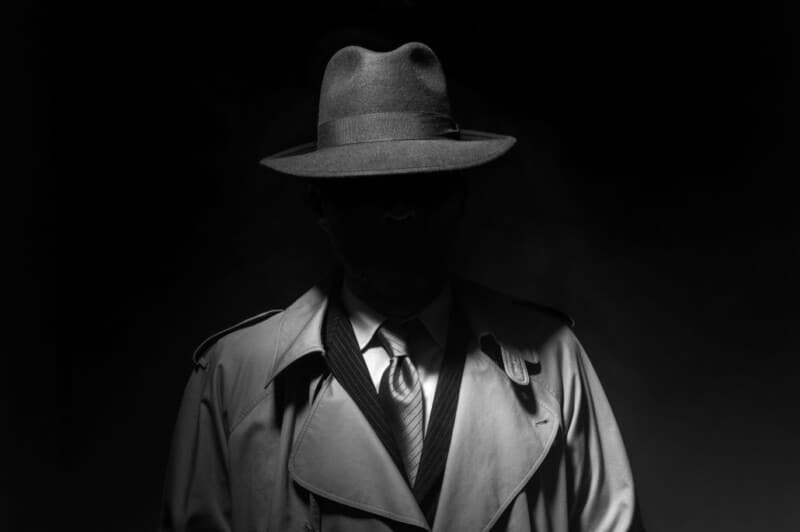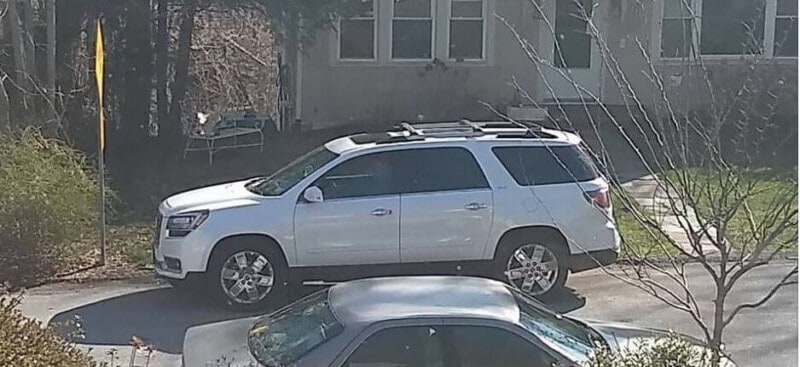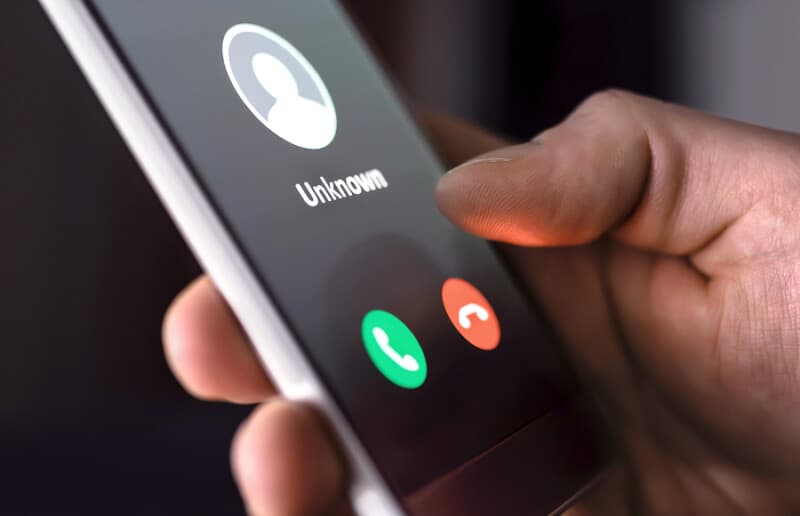


The street you live on (or work on) is technically public property and anyone can park there, including private investigators. Your private property starts at the curb. Even the sidewalk right in front of your house is public property. We can, technically, stand on that sidewalk right in front of your house and this is not considered trespassing. This is, of course, VERY bad form and no self-respecting private investigator would ever dare do this, but legally we are allowed.
Although we aren’t allowed to peek inside your house for ANY reason, we are allowed to park on the public street with a clear view of your house or workplace and take photographs or videos of you the instant you step outside. (BE WARNED: Peeking in through open windows and/or blinds is a legal grey area…it COULD be argued that if it’s visible from public property, then you wouldn’t have a “reasonable expectation of privacy,” but that’s a very narrow and very scary edge that would terrify even the most morally loose private investigator and no one who values his or her license would want any part of it.)
Once you leave the physical confines of your house or workplace and are within view of the general public, there is no longer an expectation of privacy. Even things that happen inside your car aren’t off-limits. If we can technically “see” it from public property, then we can record it. That is a fancy way of saying that everything you do is now in the public realm and we can watch you and take your photograph while you do it. Hopefully, without you even suspecting we are there (if you spot us, we have failed).
This doesn’t mean you shouldn’t be vigilant about strange or suspicious vehicles parked on your street. If you see a vehicle that you feel doesn’t belong there, please call the police. The police will question the individual and make sure they have a legitimate reason for being there. And if not, they will force the person to leave.
Nope. The right to consent is only available for commercial use and only holds if we plan to sell your image for profit (even this is a grey area–think paparazzi). This is the source of the confusion. Because private investigators are paid for their services, it’s oftentimes confusing for the general public that they can obtain “evidence” without the person’s consent. However, the workaround is that private investigators are paid for their time and their expertise, not for the evidence we obtain. We are not selling the picture or the video, we are selling ourselves and our effort and, therefore, do not require your consent to photograph you. Smile!

This is kind of a corollary to #1 above, but I wanted to re-iterate it again. If we can “see” you from where we are on public property, you are fair game. Be VERY careful about what you do in public. We are very sneaky and have all kinds of high-tech sorcery that allow us to blend in and appear bland and nondescript. Forget the fedora, trenchcoat, and magnifying glass. We make our livings out of blending in and not drawing attention to ourselves. Again, if you notice we are there, we have failed.
Negative. We can’t ENTER your vehicle (obviously), but your car has windows and we can see through those windows just like you can. If we can SEE it from public property, then we can RECORD it from public property. I’ll say it again for the people in the back: BE VERY CAREFUL WHAT YOU DO IN PUBLIC! If you don’t want to see yourself on video in a court of law one day or you are doing something you wouldn’t want your spouse to know about, think twice before doing it anywhere in public. Think twice before doing it at all, but you get my point.

This one surprises a lot of folks. Destroy/shred/whatever anything you don’t want to be recorded, gone through, and shown to a judge/jury, your insurance company, or your spouse. Don’t throw away your bank statements, telephone records, or the receipts you used to take your mistress out on the town. Destroy them. Even shredding has its limitations and a highly skilled and resourceful private investigator can piece them back together again.
There is one caveat, though: we can’t touch it, look at it, open it, etc. until you set it out to be collected by the city. Trespassing laws are pretty strict and until you set it out on the street to be collected, it’s still on your property and we can’t touch it. We can, however, watch your property and scoop it up as soon as you set it out for the garbage man.
Also, don’t set your trash out “the night before.” Wait until the morning of pickup to set out your trash and do it as close to pick up time as you can. This will minimize the window of time that thieves and others (we) have to scoop it up. If it’s out there all night while the whole world is asleep, then you’re just asking for it to end up on a table somewhere and poked through.
This is given the fancy-sounding name “pretexting.” Whatever you call it, it’s basically lying and this right here is one of the many reasons private investigators have kind of a “shady” reputation with the general public. A pretext is a gambit designed to do one thing, trick you (or those who know you) into giving us information. And in this game, information is everything. Private investigators are in the information-gathering business. It’s what we do.

There are a couple things we can NOT do within this arena. We can’t misrepresent ourselves as law enforcement or a representative of a real-life company. That’s a big no-no. We also can’t misrepresent ourselves as a real person to get private information on that person. A private investigator can’t call your bank and pretend to be you in order to get information about your account, for example. It’s also a legally grey area to use pretext when a subject is represented by counsel in pending litigation. This can potentially land the private investigator in trouble with the court and that investigator could find him or herself at the business end of a TRO and/or harassment suit.
But, we can certainly be your “long-lost classmate” who is looking for you so we can get your address for our upcoming class reunion, we can be an “old college buddy” from back in the day who is inviting people to the wedding of someone we know you have in common, or we can pretend to have something of value that you “dropped on the subway” and we would very much like to return it, if only we knew where you work so we could drop it off, etc. It sounds hokey and like something that would never work, but you’d be surprised at the information you can get if you ask for it the right way.
Wrong again. This is a common misconception spread by television and movies. Much like a police officer doesn’t have to tell you they are a police officer if you point-blank ask them (this is also a myth), a private investigator does not (and never would) disclose who they are during a pretext scenario. This would invalidate the entire reasoning behind the endeavor. We want the information, and as long as we don’t misrepresent ourselves as law enforcement or the representative of a real-life company (see above), then we can misdirect and set off-guard anyone we think can point us in the right direction.
Private investigators have access to all kinds of juicy information about you. You’d be awestruck at the sheer volume of information about you that is floating around in the world. Edward Snowden didn’t even scratch the surface of the surface. Everything you do online is cataloged and databased and essentially sold to the highest bidder under the context of “advertising.”
There are a few things we (or anyone else) aren’t privy to. For example, medical ( HIPAA) and financial records are off-limits and protected by the federal government. Interestingly, so are educational credentials ( FERPA). We can’t get your college transcripts, your bank records, or the results from your most recent doctor’s appointment. But pretty much everything else is available for the taking for someone who is crafty and knowledgeable enough to know where to find it. This skill oftentimes goes by the moniker OSINT (Open-Source INTelligence) and is a service we offer to our clients, both outbound (gathering outside information on another person) and inbound (shedding light on their own vulnerabilities).

Just know that your data is out there and it’s never coming back. Be very careful who you allow to have access to your information and check your passwords and privacy settings often. It’s the wild west out there.
So, that was five things that private investigators are legally allowed to do. There are many more, of course, and we will discuss those in a future post. Many of the laws governing private investigators are state-specific and what is allowed in one state may be banned in another (recording phone conversations, for example). But this list is pretty inclusive. Most of the private investigators licensed and working in the US today are able to (at a minimum) do the things outlined in this list. And it’s all perfectly legal.
Check out our next post where we will discuss some of the many things private investigators CAN NOT do, under any circumstances.

Shaun is the owner of Red Door Investigations. He has a Ph.D. in psychology from the University of Texas at Arlington and is a licensed pilot and certified scuba instructor.
![]()
11792
![]()
No Comments
Gear is a very important part of any private investigator’s toolbox. The tools of our trade are usually pretty high-tech and oftentimes quite expensive. Private investigators are usually very opinionated on gear and we can talk about it nonstop if you let us (and sometimes even if you don’t). We are very vocal in our support of one brand or another and whether this will help us get evidence better or that will allow us to be just a wee bit sneakier. However, ultimately the investigation equipment we choose needs to accomplish three things: it needs to be useful, it needs to be durable, and it needs to be high-quality. If it makes us feel more covert and look super-cool in the process, all the better.
And that’s it! This pretty much sums up the private investigation gear and equipment we use every day and shows a few of the things on our wishlist. If you are in the biz, do you agree or disagree with our suggestions? Leave a comment down below if you use some of the same things we do or if you think what you use is better.

Shaun is the owner of Red Door Investigations. He has a Ph.D. in psychology from the University of Texas at Arlington and is a licensed pilot and certified scuba instructor.